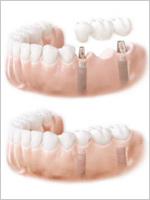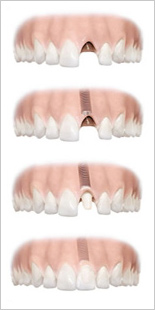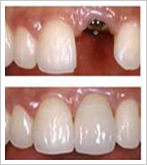Pattaya Dental Implants
| Pattaya Dental Implants are a means of replacing missing teeth without the use of dentures, although in certain circumstances dental implants can be used to secure dentures and so overcome the problems associated with normal denture wearing. As implants are totally self supporting, they do not require other teeth to aid them. Well Established Technology Implant technology was developed almost 40 years ago and has successfully been used in dentistry for at least thirty years. As this specialised dental implant treatment requires very advanced training and skills, only a few dental practices throughout the country, of which we are one, are able to offer this treatment. |
 |
||
| Available Bone A dental implant is a metal post made from titanium which is a metal rarely rejected by the body. Implants can be used to replace a single missing tooth, several, or all missing teeth provided there is enough bone available. When teeth are lost, there is immediately set into motion a natural, lifelong, but completely irreversible process of bone and gum loss. The most rapid loss is in the first 3 – 6 months after teeth are missing, but thereafter the process only slows down and continues throughout life. Once lost, bone and gum cannot grow back naturally. For the latter reason, it is ideal to consider dental implant treatment as soon as possible after teeth are lost, as several years later, there may be insufficient bone available to place them. The degree and rapidity of bone loss varies with the individual. |
|||
| Bone Augmentation If there is insufficient bone available to place dental implants, but the loss has not gone beyond a certain point, new bone can be regenerated in the intended implant site using a technique called Bone Augmentation. This requires using either irradiated powdered human bone or an artificial substitute and can take up to six months to complete. If Bone Augmentation cannot be used, then the only other possible alternative is to transplant bone from the hip to the jaw, but this can only be provided privately in hospital. Dental Implant Retained Dentures Dental Implants can be used to support dentures and it us usually full lower dentures that cause most problems, although they can equally be used to support full upper dentures. The underside of full lower dentures are designed to fit over a ridge of bone. However, the ongoing bone loss that occurs when teeth are missing causes this bony ridge to eventually disappear so that the curved underside of the denture cannot fit onto the flat surface of the gum. At this point there is absolutely nothing conventional dentistry can do, other than to suggest using fixatives which may have to be applied several times daily. At this stage the denture is often so loose that most patients simply cease to wear it. |
 |
||
To solve this problem, a minimum of 2 – 3 dental implants can be placed into the lower jaw either a gold bar or precision fittings are fitted to the dental implants onto which a new full denture clips into place. Although a denture is still maintained, for many patients this is a very acceptable solution as they are comforted in the knowledge that their denture is securely attached to the dental implants and cannot fall out during eating, drinking or socialising. For those patients who want to eliminate their full dentures all together, providing there is enough bone available, possibly between 8 – 12 implants could be placed in either jaw to support a bridge containing up to 12 – 14 crowns. |
|||
Age Limitations? Dental Implants can only be used when all bodily growth has stopped which is normally age 16 years for girls and age 18 years for boys. There is no upper age limit for dental implant treatment provided there is enough bone available. Certain medical or psychological conditions may prevent implant treatment. |
|||
Benefits of Dental Implant Treatment At present, implants are the best that technology can offer in replicating the function and aesthetics of natural teeth. Equally, dental implants are totally self supporting and do not require other teeth to aid them. In comparison, conventional bridges require teeth to support them. Irreversible damage is caused to these supporting teeth, plus the stresses of supporting a bridge can also shorten their expected life span. If the proposed supporting teeth for a bridge are already very heavily filled or slightly broken down, then crowning will strengthen them and improves their cosmetics. |
 |
||
| The presence of dental implants stabilises bone loss at the implants site as it tricks the body into thinking tooth roots are present. Many implants are still functioning well after 20 years, although no guarantee can be given as to their longevity as dentistry is not a precise science. The aesthetic and oral health benefits of dental implants are considerable, even compared to other fine methods of restoration featured at Central Pattaya Dental Center. These benefits include:
|
|||
Long-Term Predictability
Long term success of pattaya dental implant treatments requires keeping the mouth as clean and plaque free as possible on a daily basis. Regular ongoing professional care and maintenance is also required. Implant retained dentures should be removed daily for cleaning together with the gold bar and/or precision fittings. Any accumulation of plaque or calculus (hardened plaque) can allow bacteria to tract down and destroy the bone surrounding the implants and cause them to fail together with the restorations they are supporting.![]()
|
